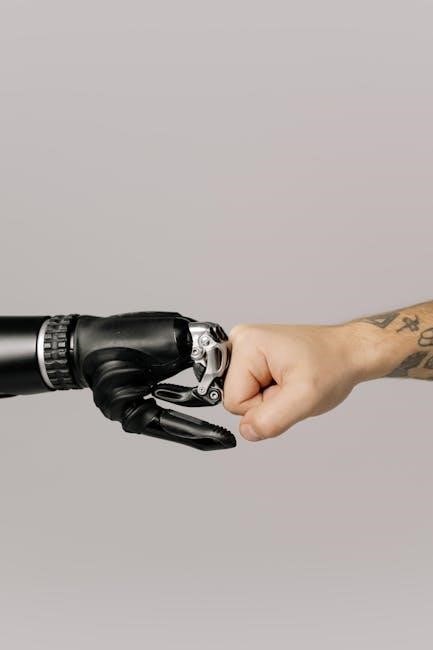mechanical engineering pdf
Mechanical engineering combines physics‚ mathematics‚ and materials science to design‚ analyze‚ and manufacture mechanical systems․ It encompasses thermodynamics‚ mechanics‚ and materials‚ with resources like e-books and handbooks available for comprehensive understanding․
1․1 Definition and Scope of Mechanical Engineering
Mechanical engineering is a broad discipline that applies principles of physics‚ mathematics‚ and materials science to design‚ analyze‚ and manufacture mechanical systems․ It involves the production and use of heat‚ mechanical power‚ and motion․ The scope includes energy systems‚ robotics‚ biomechanics‚ and aerospace engineering‚ with resources like PDF books providing foundational knowledge for students and professionals․
1․2 Historical Development of Mechanical Engineering
Mechanical engineering traces its roots to ancient civilizations‚ with advancements in machinery and tools; The Industrial Revolution marked a significant leap‚ introducing steam engines and factory systems․ Modern developments include aerospace engineering‚ robotics‚ and biomechanics․ Educational institutions have played a crucial role‚ with programs like Drexel University’s research initiatives․ Historical progress highlights the evolution of manufacturing‚ energy systems‚ and design methodologies‚ shaping the field into its current form․

Key Topics in Mechanical Engineering
Mechanical engineering covers thermodynamics‚ fluid mechanics‚ and materials science․ Resources like textbooks and guides provide in-depth knowledge on machine design‚ mechatronics‚ and manufacturing processes for engineers․
2․1 Thermodynamics and Energy Systems
Thermodynamics is central to mechanical engineering‚ focusing on energy conversion and transfer․ Resources like e-books and lecture notes cover fundamental laws‚ such as the first and second laws‚ and their applications in energy systems․ These materials help engineers design efficient systems‚ from power generation to refrigeration‚ ensuring optimal performance and energy conservation․
2․2 Fluid Mechanics and Dynamics
Fluid mechanics explores the behavior of fluids under various forces‚ covering topics like fluid statics‚ dynamics‚ and Bernoulli’s principle․ It addresses viscous flow‚ turbulence‚ and pipe flow analysis․ Resources such as PDF textbooks and lecture notes provide detailed insights into these principles‚ enabling engineers to design efficient systems involving liquids and gases‚ from hydraulic systems to aerodynamics‚ ensuring optimal performance and fluid flow management․
2․3 Materials Science and Manufacturing
Materials science focuses on the properties‚ selection‚ and application of metals‚ polymers‚ and composites․ Manufacturing processes like casting‚ machining‚ and 3D printing are explored․ PDF resources provide detailed insights into material behavior and production techniques‚ aiding engineers in creating durable and efficient mechanical systems while addressing modern advancements in materials technology and sustainable manufacturing practices for optimal performance․
Mechanical Engineering PDF Resources
Mechanical engineering PDF resources offer free e-books‚ lecture notes‚ and course materials on thermodynamics‚ machine design‚ and materials science for students‚ engineers‚ and researchers․
3․1 Free E-Books and Lecture Notes
Free e-books and lecture notes on mechanical engineering cover essential topics like thermodynamics‚ machine design‚ and materials science․ Resources from platforms like EngineeringHulk offer downloadable PDFs for students‚ engineers‚ and researchers․ These materials provide foundational knowledge and advanced insights‚ making them invaluable for academic and professional development in the field․ They are curated by experts to ensure quality and relevance․
3․2 Comprehensive Course Materials
Comprehensive course materials in mechanical engineering PDFs cover a wide range of topics‚ from foundational principles to advanced applications․ These resources‚ often designed by experts‚ include detailed notes‚ problem sets‚ and solutions․ They cater to both students and professionals‚ offering in-depth insights into thermodynamics‚ fluid mechanics‚ and materials science․ These materials are essential for structured learning and professional development‚ providing a thorough understanding of mechanical engineering concepts and their practical applications․
3․3 Specialized Topics in Mechanical Engineering
Mechanical engineering PDF resources often delve into specialized topics such as mechatronics‚ robotics‚ and biomechanical systems․ These materials provide detailed insights into emerging areas like smart systems and advanced manufacturing techniques․ They also cover niche subjects such as aerospace engineering and sustainable energy solutions․ These specialized resources are designed to cater to specific interests and professional needs‚ offering deep dives into cutting-edge technologies and innovative applications within the field․

Engineering Analysis and Problem Solving
Mechanical engineering involves solving complex problems using control volume analysis‚ design principles‚ and instrumentation․ These tools enable engineers to optimize systems and ensure efficient performance․
4․1 Control Volume Analysis
Control volume analysis is crucial in mechanical engineering for studying mass and energy flow systems․ It involves defining a specific region to focus on energy interactions‚ enabling engineers to model and solve problems related to fluid mechanics and thermodynamics․ This method is widely used in designing turbines‚ engines‚ and other complex systems‚ ensuring accurate performance predictions and optimal design solutions․
4․2 Design and Instrumentation
Design and instrumentation are critical in mechanical engineering for creating and optimizing mechanical systems․ Design principles guide the development of components‚ while instrumentation ensures precise measurement and control․ Engineers rely on tools like CAD and simulation software to refine designs․ Handbooks and resources provide foundational theories and practical guides‚ enabling the creation of efficient and innovative mechanical solutions across various industries․
Educational and Research Initiatives
Leading universities and research centers advance mechanical engineering through interdisciplinary studies and experimental approaches‚ fostering innovation in core areas like mechanics and materials science․
5․1 University Programs and Research
University programs in mechanical engineering offer comprehensive courses‚ integrating core areas like thermodynamics and fluid dynamics․ Research initiatives focus on advancing materials science‚ mechatronics‚ and sustainable technologies․ These programs prepare students for innovative problem-solving and cutting-edge developments in the field‚ supported by expert faculty and state-of-the-art facilities․
5․2 Experimental Mechanical Engineering
Experimental mechanical engineering involves hands-on testing and analysis to validate theoretical concepts․ Resources like “Experimental Mechanical Engineering” by Prof․ Herman Diederichs and Prof․ William C․ Andrae provide detailed guides for engineers and students․ These materials focus on engineering instruments and laboratory practices‚ offering practical insights for real-world applications․ Such experimental approaches foster innovation and enhance problem-solving skills in mechanical engineering․

Career Development in Mechanical Engineering
Mechanical engineering offers diverse career opportunities in design‚ simulation‚ and testing․ Advanced degrees and specializations further enhance professional growth and open global opportunities․
6․1 Opportunities in Design‚ Simulation‚ and Testing
Mechanical engineering offers exciting opportunities in design‚ simulation‚ and testing․ Professionals use CAD‚ CAE‚ and simulation tools to innovate and optimize systems․ Industries like aerospace‚ automotive‚ and energy rely on these skills․ Testing ensures safety and efficiency‚ making it a critical phase in product development․ With advancements in technology‚ these roles continue to evolve‚ offering diverse and challenging career paths for engineers․
6․2 Advanced Degrees and Specializations
Pursuing advanced degrees in mechanical engineering‚ such as a Master’s or Ph․D․‚ allows for specialization in areas like mechatronics‚ aerospace‚ or materials science․ These programs deepen expertise‚ enabling engineers to tackle complex challenges and innovate․ Specialization opens doors to senior roles‚ research‚ and leadership in academia or industry‚ driving advancements in cutting-edge technologies and shaping the future of mechanical engineering․

GATE Mechanical Engineering (ME) Preparation
GATE ME preparation requires thorough practice with previous year question papers and study materials․ Utilize comprehensive resources‚ including handbooks and guides‚ to master key concepts and problem-solving techniques effectively․
7․1 Previous Year Question Papers and Study Materials
Previous year GATE ME question papers are crucial for understanding exam patterns and improving problem-solving skills․ Comprehensive study materials‚ including handbooks and guides‚ provide in-depth insights into key concepts․ Regular practice with these resources helps candidates master thermodynamics‚ mechanics‚ and materials science effectively․ Utilizing these materials ensures a well-rounded preparation strategy for achieving success in the GATE ME exam․

Mechanical Engineering Handbooks
Mechanical engineering handbooks provide fundamental laws‚ theories‚ and practical guides for design and analysis․ They cover essential topics like controls‚ mathematics‚ and instrumentation‚ serving as valuable resources․
8․1 Fundamental Laws and Theories
Mechanical engineering handbooks outline essential principles such as thermodynamics‚ fluid mechanics‚ and solid mechanics․ These resources provide foundational knowledge‚ including energy conservation‚ Newton’s laws‚ and material properties‚ crucial for design and analysis in mechanical systems․

8․2 Practical Guides for Design and Analysis
Handbooks offer practical guides for designing mechanical components and systems‚ incorporating instrumentation and control strategies․ They provide step-by-step methodologies for conducting stress analyses‚ selecting materials‚ and optimizing performance‚ serving as invaluable tools for both students and practicing engineers․
Emerging Trends in Mechanical Engineering

Mechanical engineering integrates mechatronics and smart systems‚ driving innovation in sustainable manufacturing and advanced materials‚ as highlighted in recent PDF resources and research publications․
9․1 Integration of Mechatronics and Smart Systems
Mechanical engineering is evolving with the integration of mechatronics and smart systems‚ combining mechanical components with electronic controls․ This fusion enables advanced automation‚ precision‚ and efficiency in design and manufacturing․ PDF resources highlight how these technologies optimize performance‚ reduce costs‚ and enhance reliability across industries․ Downloadable e-books and lecture notes provide in-depth insights into these emerging trends‚ essential for modern engineers․
9․2 Advances in Manufacturing and Materials Science
Advances in manufacturing and materials science are transforming mechanical engineering‚ with innovations like 3D printing and lightweight composites․ These developments enable faster production‚ improved durability‚ and sustainable practices․ PDF resources detail cutting-edge techniques‚ such as additive manufacturing and smart materials‚ revolutionizing industries․ Engineers can access comprehensive guides and research papers to stay updated on these breakthroughs‚ enhancing their expertise in modern manufacturing and material applications․

Global Engineering Process Plan
A global engineering process plan involves strategic planning‚ market analysis‚ design optimization‚ and prototyping․ It ensures efficient product development‚ addressing global standards and sustainability‚ while fostering innovation and collaboration․
10․1 Implementation Strategies for New Products
A successful global engineering process plan requires clear implementation strategies for new products․ Start with market analysis and competitive benchmarking to define product vision․ Utilize design optimization and simulation tools to refine concepts․ Prototype development and rigorous testing ensure functionality and reliability․ Plan for scalability and sustainability‚ considering global supply chains and environmental impact․ Protect intellectual property and ensure regulatory compliance․ Foster cross-functional collaboration to streamline production and distribution․ Continuous feedback loops enhance product lifecycle management and adaptability in dynamic markets․

Essential Tools and Software
CAD‚ CAE‚ and simulation tools are vital for mechanical engineering‚ enabling precise design‚ analysis‚ and prototyping․ These tools enhance productivity and innovation in engineering workflows․
11․1 CAD‚ CAE‚ and Simulation Tools
CAD (Computer-Aided Design) enables precise 3D modeling and prototyping‚ while CAE (Computer-Aided Engineering) facilitates structural and thermal analysis․ Simulation tools allow engineers to test designs under real-world conditions‚ optimizing performance and reducing errors․ These tools are essential for modern mechanical engineering‚ enhancing design accuracy‚ streamlining workflows‚ and improving overall product quality․ They are widely used in industries for efficient and innovative solutions․
Mechanical engineering remains vital‚ driving technological advancements through innovative design and analysis․ Resources like PDFs and e-books provide foundational knowledge‚ ensuring future progress in this dynamic field․
12․1 The Future of Mechanical Engineering
Mechanical engineering’s future lies in integrating mechatronics and smart systems‚ advancing manufacturing‚ and innovating materials․ Resources like PDFs and e-books support education and research‚ fostering progress in design‚ simulation‚ and sustainable technologies‚ ensuring mechanical engineering remains a cornerstone of technological advancement and problem-solving․